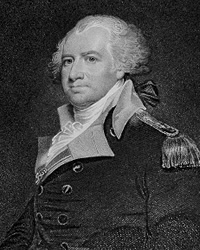Home - QM Leadership - Current QMC - Past QMCs - QMG MG Mifflin
1st Quartermaster General
Major General Thomas Mifflin
Quartermaster General | Aug 1775 - May 1776 | Oct 1776 - Nov 1777
 Thomas Mifflin, merchant, member of the Continental Congress, Revolutionary soldier and Governor of Pennsylvania, was born in Philadelphia, PA on January 10, 1744. He graduated, at the early age of sixteen, from the College of Philadelphia, now the University of Pennsylvania. After graduation he spent four years working in the counting-house of a prosperous Philadelphia merchant. Later Mifflin started a very successful business as a merchant in partnership with his brother.
Thomas Mifflin, merchant, member of the Continental Congress, Revolutionary soldier and Governor of Pennsylvania, was born in Philadelphia, PA on January 10, 1744. He graduated, at the early age of sixteen, from the College of Philadelphia, now the University of Pennsylvania. After graduation he spent four years working in the counting-house of a prosperous Philadelphia merchant. Later Mifflin started a very successful business as a merchant in partnership with his brother.
Mifflin's talent as a speaker drew him into politics. In 1772 he was elected to the provincial assembly and became recognized as a champion of Colonial rights. He became one of the youngest and most radical members of the First Continental Congress. He was also elected to the Second Continental Congress but after the battle of Lexington he turned his attention to recruiting and training troops for the Continental Army. Upon his appointment as a Major in May 1775, John Adams declared that he, "ought to have been a general" because he was the "animating soul" of the revolutionary movement.
On June 23, 1775, Mifflin was appointed as General George Washington's aide-de-camp. On August 14, 1775 Washington selected him as the Continental Army's first Quartermaster General. He was a faithful and efficient quartermaster, though he preferred the front line to administrative duties. An eye-witness declared he, "never saw a greater display of personal bravery" than Mifflin exhibited in his "cool and intrepid conduct" in leading an attack on a British foraging expedition at Lechmire's Point on November 9, 1775. The following month he was appointed to the rank of Colonel. He was promoted to Brigadier General on May 16, 1776 and at his own request was relieved of his duties as Quartermaster General. Shortly thereafter he commanded the covering party during the withdraw from Long Island, NY. In late 1776 he was sent by General Washington to Philadelphia to make a spirited appeal for replacements, which was well received.
In in October 1776 he was persuaded by the General Washington and the Continental Congress to resume the duties of Quartermaster General, due to difficulties in finding a suitable replacement. He was present at the battles of Trenton, Princeton and assisted in the defense of Philadelphia. Mifflin was appointed to the rank of Major General in February 1777. Dissatisfaction and criticism from the Continental Congress as well as ill health, caused General Mifflin to resign from both his position as Quartermaster General and his rank of Major General in October 1777. Congress pressed him to continue as Quartermaster General temporarily.
From 1777 to 1778, he served as a member of the Congressional Board of War. His relationship with General Washington was strained when he favored Horatio Gates to replace Washington as commander of the Continental Army. In April 1778 he rejoined the Army, but criticism of his service as Quartermaster General caused him to take little active participation in military affairs. His political enemies accused him of embezzlement and a Congressional committee recommended that he be held responsible for the mismanagement caused subordinates during his tenure as Quartermaster General. General Washington was directed by Congress to order an inquiry on the matter. General Mifflin invited the inquiry, claiming that Congressional interference had prevented him from properly directing the Quartermaster Department, but an inquiry never occurred. Mifflin indignantly resigned his commission as a Major General on August 17, 1778, and it was finally accepted by Congress on February 25, 1779. Despite these difficulties, Congress continued to call upon General Mifflin for advice. The most notable example was in 1780 when he assisted framing recommendations for reorganization of the Army staff departments.
He joined the Congress again from 1782 to 1784, serving as its President from December 1783 to June 1784. Mifflin was a member of the Constitutional Convention in 1787 and is one of the signers of the United States Constitution. He was elected to the supreme executive council of Pennsylvania in 1788, and from 1789-90 was the chairman of the state constitutional convention. He served three distinguished terms as Governor of Pennsylvania from 1790-1799. Some of his accomplishments as Governor were construction new roads improvement of inland navigation, reform of judicial establishments and strengthening of the militia.
After retiring as Governor he served in the Pennsylvania legislature until his death on January 20, 1800 in Lancaster, Pennsylvania. He is buried at Trinity Lutheran Church Cemetery, Lancaster, Pennsylvania.
General Mifflin was inducted into the Quartermaster Hall of Fame in 1987. Mifflin Hall, the Headquarters Building for the Quartermaster School, Fort Gregg-Adams, VA, historic Fort Mifflin in Philadelphia and Mifflin County, PA are named in honor of General Mifflin.
